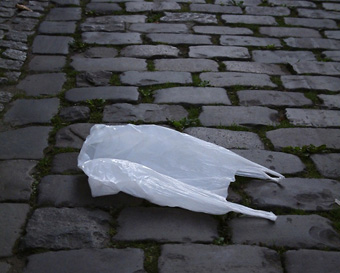Paper or Pollution? Analyzing LA's Plastic Bag Ban
 Last week, Los Angeles became the largest city in the North America to enact a ban against one of the most widely polluted items in history – the plastic bag.
Last week, Los Angeles became the largest city in the North America to enact a ban against one of the most widely polluted items in history – the plastic bag.Over the next 12 months, the use of plastic bags in the city will be phased out gradually. Larger stores will have sixmonths to phase them out, while smaller stores will have a year. The ban will affect paper bag usage too: in a year, retailers will be required to charge 10 cents per bag.
In addition to reducing waste in landfills and on streets, the ban will help decongest the city’s waterways, rivers, and ocean, which have become clogged with the bags in recent years.
The ban is also expected to help conserve fossil fuels. It’s estimated that the 380 billion plastic bags consumed annually in the U.S. eat up 12 million barrels of oil. The City of Los Angeles reportedly uses 2.7 billion plastic bags a year, making the recent ban no small drop in the barrel when it comes to scaling back our fossil fuel use.
To get a better idea of its wide-ranging effects, here’s a quick rundown of the potential economic and environmental impacts of the plastic bag ban in Los Angeles.
Economic Effects
The plastic bag ban is estimated to save the city, and the taxpayer, a significant amount of money each year in cleanup fees. The County of Los Angeles Flood Control district spent over $24 million (PDF) in 2008-2009 (the most recent year for which data are available) on litter prevention, cleanup, and disposal. And that’s not counting the $12 million (PDF) the State’s Department of Transportation (Caltrans) District 7 spent on cleaning up the 50,000 cubic yards of litter and debris along the city’s highways. With plastic bags being a major contributor to litter on the streets, the ban will save the city a lot of money in cleanup fees alone.
However, there is an economic con to this decision, and it falls on plastic bag manufacturers. Many employees from manufacturing plants protested the City Council’s decision, citing fears of unemployment. According to an industry group, the decision to ban the bags threatens the jobs of over 2,000 workers.
Although the trend of banning plastic bags has had an effect on large retailers across the United States, many are taking adaptive measures and are joining the fight against plastic bags. In addition, the ban is not expected to put any stores out of business.
Environmental Effects
Marine pollution is one of the most pressing environmental concerns facing the world today, and plastics amount to 90% of the trash on the ocean’s surface. It harms marine life and breaks down into microscopic plastic dust, which attracts more debris and compounds the problem. A ban on plastic bags, especially in a place like Los Angeles with vital rivers, waterways and access to the ocean, is a critical effort to tempering the pollution problem in the world’s oceans.
Banning plastic bags also helps conserve non-renewable fossil fuels. Plastic production is responsible for roughly 8% of the world’s oil production. Any reduction in plastic use will help decrease greenhouse gas emissions and overall energy consumption.
Finally, plastic bags take up room in landfills. Although nobody likes the idea of a landfill, waste in a landfill is cut off from air and water, which prevents contamination. Another one to three percent of the hundreds of billions bags produced each year end up as “strays,” which can be found around the globe.
The plastic bag ban in Los Angeles is part of a growing trend of cities, states, and even countries banning or taxing their use. With a wide array of positive economic and environmental effects, this ban and similar initiatives are leading the way to cleaner and healthier communities and ecosystems.
You can return to the main Market News page, or press the Back button on your browser.

